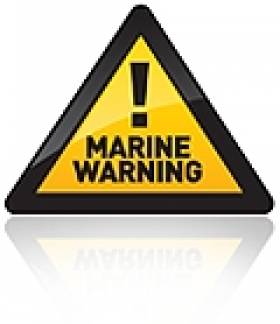Displaying items by tag: Claire Buoyant
New Marine Notices on Small Vessel Safety
#MARINE WARNING - Two recent Marine Notices from the Department of Transport, Tourism and Sport (DTTAS) highlight the safety recommendations made in reports by the Marine Casualty Investigation Board (MCIB) earlier this year into separate small vessel accidents, one of which resulted in the death of two fishermen.
Marine Notice No 39 of 2012 details recommendations from the report into the Lady Linda tragedy off the coast of Skerries in North Dublin in April last year, which cost the lives of 26-year-old Ronan Browne and 41-year-old David Gilsenan.
In its investigation, the MCIB noted a number of contributary factors to the incident, such as weather conditions and wave height, the absence of lifejackets and the inaccessibility of emergency equipment.
The DTTAS is urging all fishermen to check weather conditions before any voyage and ensure that their vessel can cope with them safety. It also reiterates the legal obligation for fishermen to wear suitable personal flotation devices while on deck, and that the carriage of an EPIRB distress becaon is mandatory for all fishing vessels.
Meanwhile, Marine Notice No 40 of 2012 concerns the carriage of livestock aboard small vessels, after an incident on the MV Claire Buoyant off Beginish Island in Co Kerry in August a year ago that led to a cargo of 21 sheep being jettisoned overboard.
The MCIB report reminded that any vessel carrying livestock must be appropriately certified due to the dangers involved in transporting live cargo. It also recommended that such vessels develop a regular maintenance regime to check all fittings that are open to the sea, and to ensure that bilge pumps are free from blockage.
#MCIB - The families of two fishermen found dead at sea off the Skerries last April may never uncover the circumstances that led to their demise. But the official report into the incident indicated that the absence of lifejackets was a significant contributing factor.
Ronan Browne (26) and David Gilsenan (41) were reported missing on the evening of 1 April after failing to return from a trip tending to lobster pots.
Their vessel, Lady Linda, was found the following morning upturned in an oil slick off Clogherhead with no sign of the crew.
It wasn't until a week later that their bodies were discovered caught in the vessel's fishing gear some five miles east of Clogherhead, as previously reported on Afloat.ie.
Post-mortem results found that both men died from drowning, with Gilsenan also showing signs of hypothermia.
With no eyewitnesses to the incident, the report by the Marine Casualty Investigation Board (MCIB) indicated a number of possible causes from eqiupment malfunction or shifting of lobster pots on deck, to the wave height and weather conditions on the day, which were reportedly deteriorating when the boat left port.
It also said that Browne and Gilsenan "were lifelong friends, both men were experienced and qualified marine engineers in the fishing vessel industry. Both men were experienced in boat handling and fishing and had worked together on many occasions."
But the report emphasised the lack of personal flotation devices (PFDs) on board, and noted that emergency equipment was stored under the deck and not easily accessible.
The MCIB's recommendations include a review of the code of practice for fishing vessels under 15m to establish "revised stability critera" and ensuring that all boats are fitted with automatic radio beacons that deploy upon capsize.
In a separate incident, lack of proper maintenance led to an unlicenced boat taking on water off Co Kerry last August.
The Claire Buoyant was carrying one crew, five passengers and 21 sheep from Beginish Island to Ventry when the vessel began to lose stability.
Skipper Eoin Firtear - who the MCIB described as having "limited sea-going experience" - and his five passengers were rescued by passenger ferry. All sheep were jettisoned overboard, with 18 eventually recovered.
The report reminded that the carriage of livestock should only be undertaken in appropriately certified vessels.
- MCIB
- Marine Casualty Investigation Board
- report
- Lady Linda
- Clogherhead
- Ronan Browne
- David Gilsenan
- lobster pots
- Fishing
- drowning
- hypothermia
- missing
- malfunction
- wave height
- Weather
- lifejackets
- Personal Flotation Devices
- PFDs
- Code of Practice
- stability
- Radio
- beacon
- maintenance
- unlicenced
- Co Kerry
- Claire Buoyant
- Sheep
- Passengers
- Beginish Island
- Ventry
- Eoin Firtear
- Skipper
- Rescue
- Livestock






























































